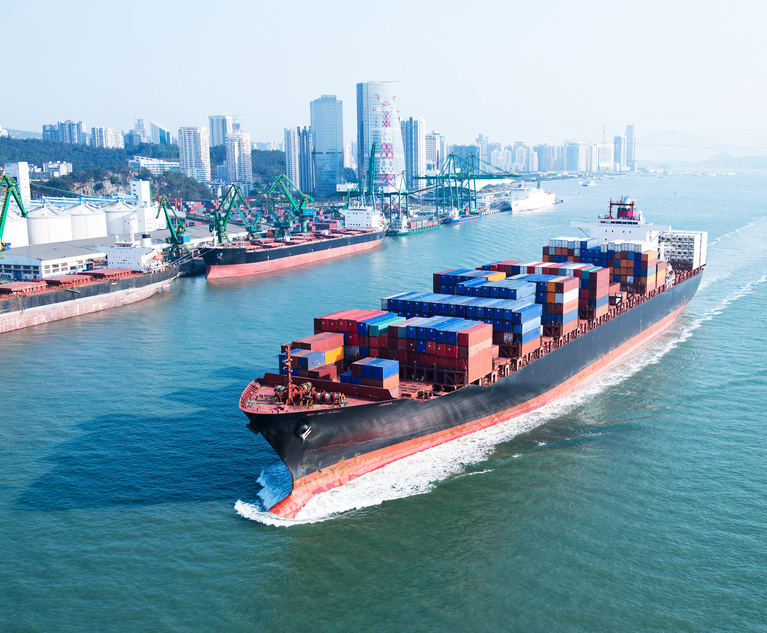 Credit: xy/Adobe Stock
Credit: xy/Adobe Stock US Businesses Propose Hiding Trade Data Used to Trace Abuse
Data collected from vessel manifests is vitally important for researchers and reporters seeking to hold corporations accountable for the mistreatment of workers in their foreign supply chains.
October 18, 2022 at 01:38 PM
6 minute read
A group of major U.S. businesses wants the government to hide key import data, a move trade experts say would make it more difficult for Americans to link the products they buy to labor abuse overseas.
The Commercial Customs Operations Advisory Committee is made up of executives from 20 companies, including Walmart, General Motors and Intel. The committee is authorized by U.S. Customs and Border Protection to advise on ways to streamline trade regulations.
Last week, ahead of closed-door meetings starting Monday in Washington with senior officials from CBP and other federal agencies, the executives quietly unveiled proposals they said would modernize import and export rules to keep pace with trade volumes that have nearly quintupled in the past three decades. The Associated Press obtained a copy of the proposal from a committee member.
Among the proposed changes: making data collected from vessel manifests confidential.
The information is vitally important for researchers and reporters seeking to hold corporations accountable for the mistreatment of workers in their foreign supply chains.
Here's how it works: Journalists document a situation where laborers are being forced to work and cannot leave. They then use the shipping manifests to show where the products end up, and sometimes even their brand names and whether they're on a shelf at a local supermarket or a rack of clothes at a local mall.
The proposal, if adopted, would shroud in secrecy customs data on ocean-going freight responsible for about half of the $2.7 trillion in goods entering the U.S. every year. Rail, truck and air cargo is already shielded from public disclosure under U.S. trade law.
"This is outrageous," said Martina Vandenberg, a human rights lawyer who has filed petitions with CBP seeking to block shipments of goods suspected of being made by forced labor.
"Every year we continue to import and sell millions of dollars in goods tainted by forced labor," said Vandenberg, president of the Washington-based Human Trafficking Legal Center. "Corporate America should be ashamed that their answer to this abuse is to end transparency. It's time they get on the right side of history."
CBP said it would not comment on ideas that have not been formally submitted by its advisory committee but said that the group's proposals are developed with input gathered in public meetings.
But one of CBP's stated goals in creating what it has dubbed a "21st Century Customs Framework" is to boost visibility into global supply chains, support ethical sourcing practices and level the playing field for domestic U.S. manufacturers.
Reports by the AP and other media have documented how large quantities of clothing, electronics and seafood make their way onto U.S. shelves every year as a result of illegal forced labor that engages 28 million people globally, according to the International Labor Organization. Much of that investigative work — whether into clothing made by Uyghurs at internment camps in China's Xinjiang region, cocoa harvested by children in the Ivory Coast or seafood caught by Philippine fishermen toiling in slave-like conditions — starts with shipping manifests.
"Curtailing access to this information will make it harder for the public to monitor a shipping industry that already functions largely in the shadows," said Peter Klein, a professor at University of British Columbia, where he runs the Hidden Costs of Global Supply Chains project, an international collaborative between researchers and journalists.
"If anything, CBP should be prioritizing more transparency, opening up records of shipments by air, road and rail as well."
In its 34-page presentation, the business advisory panel said its goal in further restricting access to customs data is to protect confidential business information from "data breaches" that it says "have become more commonplace, severe and consequential."
The group also wants CBP for the first time to provide importers with advance notice whenever it suspects forced labor is being used. Activists say such a move puts whistleblowers overseas at risk of retaliation.
GM declined to comment, referring all inquiries to the Customs Operations Advisory Committee. Neither Intel nor Walmart responded to AP requests for comment.
In August alone, CBP targeted shipments valued at more than $266 million for inspection due to suspected use of forced labor, including goods subject to the recently passed Uyghur Forced Labor Prevention Act. Additionally, last month the U.S. Department of Labor added 32 products — among them acai berries from Brazil, gold from Zimbabwe and tea from India — to its list of goods possibly made with child or forced labor, making them targets for future enforcement actions.
The proposal to make vessel data confidential comes as American companies are under increasing pressure from consumers to provide greater transparency regarding their sourcing practices, something reflected in the ambitious language found in many corporate social responsibility statements.
But Vandenberg said the proposed restrictions are in line with less-touted litigation and lobby efforts by major companies to water down enforcement of the U.S. ban on forced labor.
She cited a brief filed last week by the American Chamber of Commerce, the world's largest business federation, in a case now before a federal appeals panel in Washington. At issue is whether tech companies can be held responsible for the death and injury of children in the Democratic Republic of Congo forced to mine cobalt that ends up in products sold in the U.S.
The lawsuit was brought by families of dead and maimed children against tech giants Alphabet (the parent company of Google), Apple, Dell Technologies, Microsoft and Tesla under what's known as the U.S. Trafficking Act, which allows victims to sue ventures that benefit financially from forced labor. The case was dismissed last year after a district judge found the companies lacked sufficient ties to the tragic working conditions in the DRC.
The Chamber of Commerce, in asking the appeals panel to uphold that decision, said the serious global problem of forced labor is best addressed by private industry initiatives, Congress and the executive branch — not U.S. courts.
Such suits "often last a decade or more, imposing substantial legal and reputational costs on U.S. companies that transact business overseas," the Chamber of Commerce wrote in a friend-of-the-court filing.
The mismatch in rules governing disclosure of trade data for different forms of transportation goes back to 1996, when lobbying by the airline industry reversed a law passed by Congress that same year that for the first time required air freight manifests be made public.
In 2017, Scottsdale, Arizona-based ImportGenius — a platform used to search shipping data — was among companies that unsuccessfully sued the federal government seeking to obtain aircraft manifests.
"Suppressing information about goods coming into our country is breathtakingly stupid," said Michael Kanko, CEO of ImportGenius. "From discovering imports of human hair linked to forced labor, to understanding the flow of PPE during the pandemic, to tracking importers of tainted, deadly dog treats, public access to this data has empowered journalism and kept consumers safe. We need more transparency in trade, not less."
Joshua Goodman reports for the Associated Press. AP Writer Martha Mendoza contributed to this report.
NOT FOR REPRINT
© 2025 ALM Global, LLC, All Rights Reserved. Request academic re-use from www.copyright.com. All other uses, submit a request to [email protected]. For more information visit Asset & Logo Licensing.
You Might Like
View All

U.S. Eleventh Circuit Remands Helms-Burton Trafficking Case Involving Confiscated Cuban Port
3 minute read
Blank Rome Adds 4 From Akerman in Second 2024 White Collar Group Hire
4 minute read
Florida Ports Get Cargo Traffic Boost, See Cruise Rebound
Trending Stories
- 1Midsize Firm Bressler Amery Absorbs Austin Boutique, Gaining Four Lawyers
- 2Bill Would Allow Californians to Sue Big Oil for Climate-Linked Wildfires, Floods
- 3LinkedIn Suit Says Millions of Profiles Scraped by Singapore Firm’s Fake Accounts
- 4Supreme Court Agrees to Hear Lawsuit Over FBI Raid at Wrong House
- 5What It Takes to Connect With Millennial Jurors
Who Got The Work
J. Brugh Lower of Gibbons has entered an appearance for industrial equipment supplier Devco Corporation in a pending trademark infringement lawsuit. The suit, accusing the defendant of selling knock-off Graco products, was filed Dec. 18 in New Jersey District Court by Rivkin Radler on behalf of Graco Inc. and Graco Minnesota. The case, assigned to U.S. District Judge Zahid N. Quraishi, is 3:24-cv-11294, Graco Inc. et al v. Devco Corporation.
Who Got The Work
Rebecca Maller-Stein and Kent A. Yalowitz of Arnold & Porter Kaye Scholer have entered their appearances for Hanaco Venture Capital and its executives, Lior Prosor and David Frankel, in a pending securities lawsuit. The action, filed on Dec. 24 in New York Southern District Court by Zell, Aron & Co. on behalf of Goldeneye Advisors, accuses the defendants of negligently and fraudulently managing the plaintiff's $1 million investment. The case, assigned to U.S. District Judge Vernon S. Broderick, is 1:24-cv-09918, Goldeneye Advisors, LLC v. Hanaco Venture Capital, Ltd. et al.
Who Got The Work
Attorneys from A&O Shearman has stepped in as defense counsel for Toronto-Dominion Bank and other defendants in a pending securities class action. The suit, filed Dec. 11 in New York Southern District Court by Bleichmar Fonti & Auld, accuses the defendants of concealing the bank's 'pervasive' deficiencies in regards to its compliance with the Bank Secrecy Act and the quality of its anti-money laundering controls. The case, assigned to U.S. District Judge Arun Subramanian, is 1:24-cv-09445, Gonzalez v. The Toronto-Dominion Bank et al.
Who Got The Work
Crown Castle International, a Pennsylvania company providing shared communications infrastructure, has turned to Luke D. Wolf of Gordon Rees Scully Mansukhani to fend off a pending breach-of-contract lawsuit. The court action, filed Nov. 25 in Michigan Eastern District Court by Hooper Hathaway PC on behalf of The Town Residences LLC, accuses Crown Castle of failing to transfer approximately $30,000 in utility payments from T-Mobile in breach of a roof-top lease and assignment agreement. The case, assigned to U.S. District Judge Susan K. Declercq, is 2:24-cv-13131, The Town Residences LLC v. T-Mobile US, Inc. et al.
Who Got The Work
Wilfred P. Coronato and Daniel M. Schwartz of McCarter & English have stepped in as defense counsel to Electrolux Home Products Inc. in a pending product liability lawsuit. The court action, filed Nov. 26 in New York Eastern District Court by Poulos Lopiccolo PC and Nagel Rice LLP on behalf of David Stern, alleges that the defendant's refrigerators’ drawers and shelving repeatedly break and fall apart within months after purchase. The case, assigned to U.S. District Judge Joan M. Azrack, is 2:24-cv-08204, Stern v. Electrolux Home Products, Inc.
Featured Firms
Law Offices of Gary Martin Hays & Associates, P.C.
(470) 294-1674
Law Offices of Mark E. Salomone
(857) 444-6468
Smith & Hassler
(713) 739-1250






